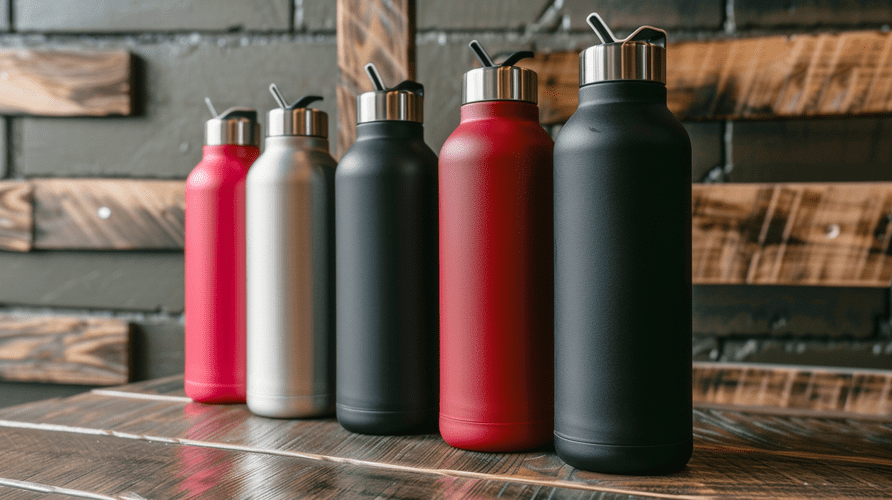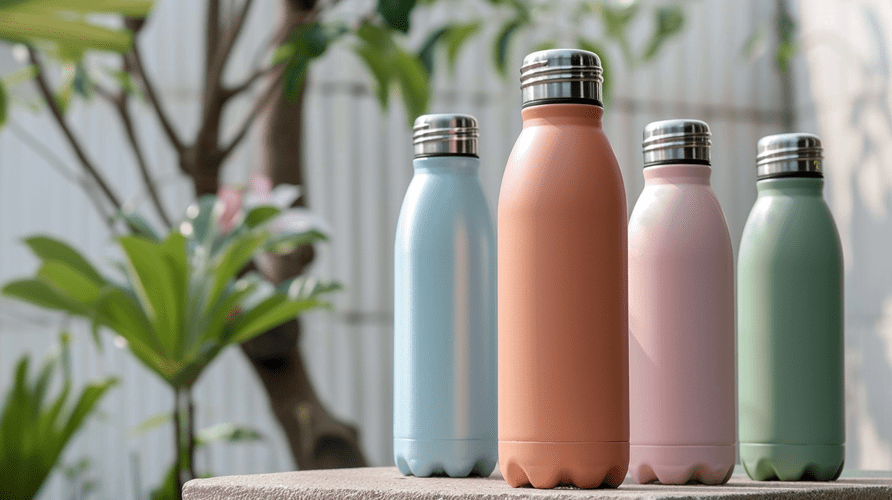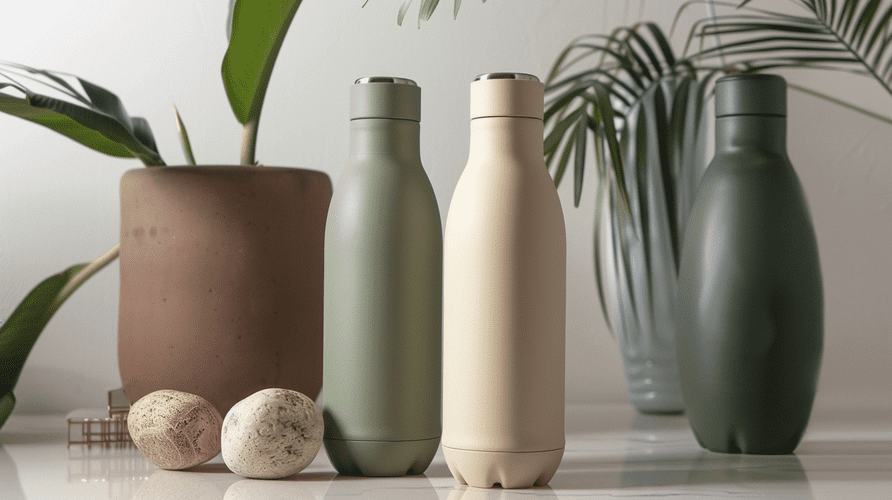Tired of endless plastic waste and the cost of disposable bottles? Reusable water bottles offer a smart, eco-friendly way to stay hydrated and save money.
Reusable water bottles are key for sustainable hydration. They cut down on plastic, keep drinks at the right temperature, and can be customized, offering great value for businesses and consumers.

Choosing the right reusable water bottle can feel like a big task. There are so many options out there. But understanding the basics makes it much easier. As a B2B supplier with Icobottle, I've helped countless clients navigate these choices. Let's explore what you need to know to pick the best bottles for your business and customers. This guide will help you understand the different types, their health aspects, and how to care for them, ensuring you make an informed decision.
Which type of reusable water bottle is best for your needs and customers?
Overwhelmed by bottle choices and unsure what your customers truly want? The wrong selection can lead to unsold stock. Understanding materials helps pick the perfect bottle for business success.
For B2B buyers, the "best" bottle aligns with your target consumer. Food-grade stainless steel, especially 304 (18/8), is a top choice for its durability, safety, and insulation capabilities.

As a B2B professional focusing on wholesale, I often guide clients like Mark Shenng, who are looking for quality and value for their own brands. The "best" reusable water bottle really depends on the end-user and the intended application.
Stainless Steel: The All-Rounder
For many businesses I work with, particularly those in America and Europe, 304-grade stainless steel (often called 18/8) is the champion. It's incredibly durable, resists corrosion, and is completely food-safe. This makes it perfect for a wide audience, from professionals to athletes. A key feature many of my clients request is double-wall vacuum insulation1. This technology keeps drinks hot for hours or cold all day, a massive selling point. The B2B market demand for stainless steel bottles is strong, and I've seen consistent growth here. Many importers are looking for that premium feel combined with practical benefits. I remember one client who switched from plastic to insulated stainless steel for their corporate gifting, and the positive feedback was immediate.
Glass: The Pure Choice
Glass bottles are prized for purity. They don't leach any chemicals and don't affect the taste of the water. Plus, glass is infinitely recyclable. However, its breakability is a major concern, especially for active users or when shipping large quantities. For some niche markets that prioritize health above all, glass can be an option, but its practicality in a B2B context for wider distribution can be limiting.
BPA-Free Plastics (like Tritan™): The Lightweight Contender
High-quality, BPA-free plastics2 such as Tritan™ offer a fantastic alternative. These bottles are lightweight, very durable, and often more budget-friendly. Tritan, specifically, is shatterproof, dishwasher-safe, and doesn't hold onto tastes or odors. This makes it a great option for businesses targeting schools, gyms, or outdoor promotions where safety and cost-effectiveness are key. We ensure all our Tritan products at Icobottle are fully certified BPA-free.
Here's a quick comparison for B2B buyers:
| Feature | Stainless Steel (304) | Glass | Tritan™ Plastic |
|---|---|---|---|
| Durability | Very High (dent-resistant) | Low (breakable) | High (shatterproof) |
| Insulation | Excellent (with vacuum) | Poor | Poor to Moderate |
| Weight | Moderate to Heavy | Heavy | Light |
| Cost | Moderate to High | Moderate | Low to Moderate |
| B2B Appeal | Premium, Versatile | Niche, Health-focused | Budget-friendly, Safe |
Ultimately, the best choice for your business will balance material safety, durability, insulation needs, your co-branding design aesthetics, and cost for your target market.
What is the healthiest reusable water bottle to offer your clients?
Health concerns about materials are valid, and your customers are likely asking for safe options. Offering the wrong product can risk brand reputation. Prioritize safe materials to build trust.
From a purely health-focused view, glass is often named the safest as it's inert. However, food-grade stainless steel (304/18/8)3 is a very healthy and practical choice. Always ensure plastics are certified BPA-free.

When procurement officers like Mark ask me about the "healthiest" options, it's a serious conversation. No one wants to associate their brand with potential health risks. My approach at Icobottle is to be transparent about materials and certifications.
Glass: Pure but Impractical for All
Glass is excellent because it’s inert – meaning it doesn’t react with the water or leach any chemicals. It’s pure. But, as we discussed, it breaks. For a company owner distributing products, the risk of breakage during shipping or by the end consumer is a significant factor. While I admire its health profile, it's not always the most practical for large-scale B2B orders.
Food-Grade Stainless Steel: Safe and Robust
This is where food-grade stainless steel, typically 304 (or 18/8), really shines. It's non-toxic and doesn't need a liner that could potentially leach chemicals. It's crucial for buyers to ensure their stainless steel bottles are genuinely made from certified food-grade material. Any internal coatings, if present for specific reasons, must absolutely be BPA-free. I always warn clients about lower-quality stainless steel, like 201 grade. It's less corrosion-resistant and might leach metals, especially with acidic drinks. For clients who need superior corrosion resistance, perhaps for electrolyte drinks or use in marine environments, 316 stainless steel is an even better, albeit more expensive, option. This is something we discuss when a client has very specific performance needs.
BPA-Free Plastics: The Modern Safe Bet
Modern BPA-free plastics like Tritan™ have been specifically developed to be safe alternatives to older plastics like polycarbonate, which raised concerns due to BPA. Tritan is highlighted as being free from harmful substances, plasticizers, and bisphenols. As a supplier, I make sure we provide all necessary certifications to prove this. This is a key point for buyers who are sensitive to quality and health but also need a cost-effective solution.
Here’s a table focusing on health aspects:
| Material | Key Health Benefit | Potential Concern | B2B Checkpoint |
|---|---|---|---|
| Glass | Inert, no chemical leaching | Breakability | Suitability for target market |
| Stainless Steel (304/18/8) | Non-toxic, no liner needed (usually) | Quality (avoid 201) | Food-grade certification |
| BPA-Free Plastic (Tritan™) | No BPA or other harmful substances | Verify "BPA-Free" status | Request material safety data sheets |
Choosing the healthiest option is about understanding these materials and ensuring proper certification.
How long should you and your customers expect a reusable water bottle to last?
Unsure about bottle lifespan? Your customers definitely expect durability from a reusable product. Frequent replacements are costly and create a poor sustainability image. Choose durable materials.
The lifespan of a reusable bottle varies by material and care. High-quality stainless steel bottles can last for many years, potentially a lifetime. Tritan™ is also very robust. Proper cleaning is essential.

When I discuss longevity with clients, it ties directly into the value proposition of reusable bottles. The idea is to reduce waste and offer a product that lasts. Mark, for instance, is focused on quality, and longevity is a big part of that for his rebranded products in Canada.
Stainless Steel: Built to Last
High-quality stainless steel water bottles are real workhorses. They are designed for durability. They resist dents, rust, and corrosion. With proper care, they can genuinely last for many, many years – potentially a lifetime. This makes them an incredibly sustainable choice. I've had my own Icobottle stainless steel bottle for years, and it's still going strong. This is the kind of long-term value that impresses customers.
Glass: Handle with Care
Glass bottles, while offering purity, have a lifespan limited by their fragility. One accidental drop can be the end of it. So, while the material itself doesn't degrade, its usable life can be short if not handled carefully.
Tritan™ Plastic: Surprisingly Tough
Tritan™ plastic bottles are very robust. They are specifically engineered to be shockproof and virtually unbreakable. This gives them a long lifespan, often rivaling stainless steel in terms of resistance to everyday wear and tear, though they might show scratches over time more readily than steel.
General Care Extends Lifespan
Regardless of the material, proper care is absolutely essential. Regular washing prevents bacteria buildup and keeps the bottle fresh. For any bottle with moving parts or seals, like the silicone gaskets in lids, these should be inspected periodically. They might wear out before the bottle itself and may need replacement to maintain a leak-proof seal. At Icobottle, we consider the availability of replacement parts for some models, as this extends the overall value for our B2B clients and their customers. Emphasizing sustainability also means encouraging the use of durable bottles that don’t need frequent replacement.
Consider this lifespan overview:
| Material | Typical Lifespan | Key Care Tip | B2B Note |
|---|---|---|---|
| Stainless Steel | Many years to Lifetime | Hand wash often, check seals | Emphasize durability, sustainable choice |
| Glass | Variable (until broken) | Handle carefully, check for chips | Higher risk in shipping/use |
| Tritan™ Plastic | Many years | Dishwasher safe (top rack), avoid abrasives | Highlight "unbreakable" aspect |
Conclusion
Choosing the right reusable bottle means weighing material benefits, health factors, and expected lifespan. This ensures sustainable hydration and happy customers for your business.
-
Discover how double-wall vacuum insulation keeps drinks at the desired temperature, enhancing user experience. ↩
-
Learn about BPA-free plastics like Tritan™, which offer safety and durability, ideal for budget-conscious consumers. ↩
-
Explore the health benefits of food-grade stainless steel to understand why it's a top choice for safe water bottles. ↩

